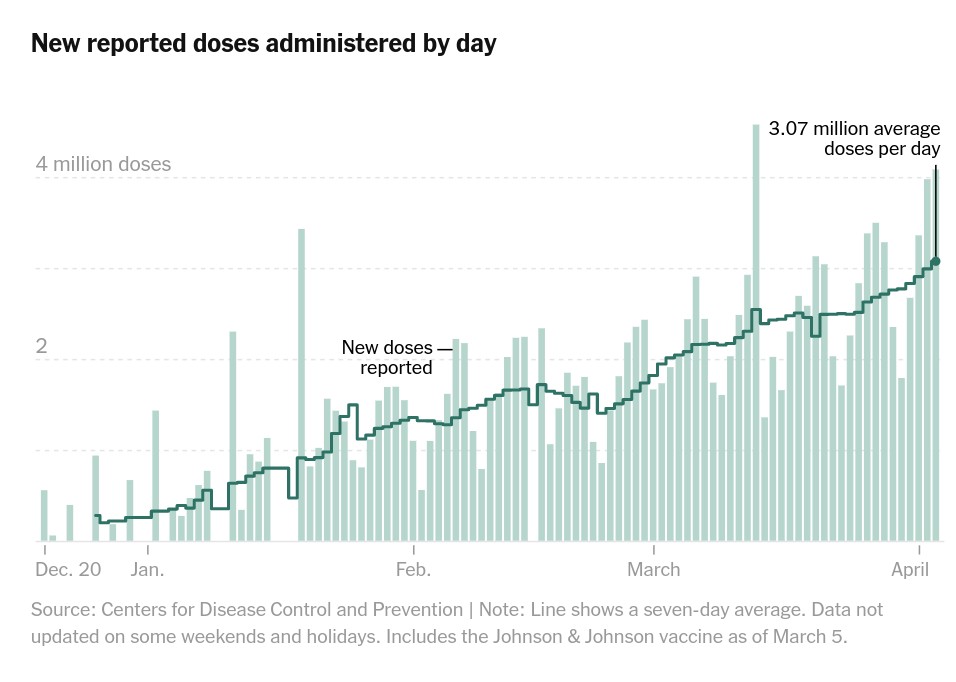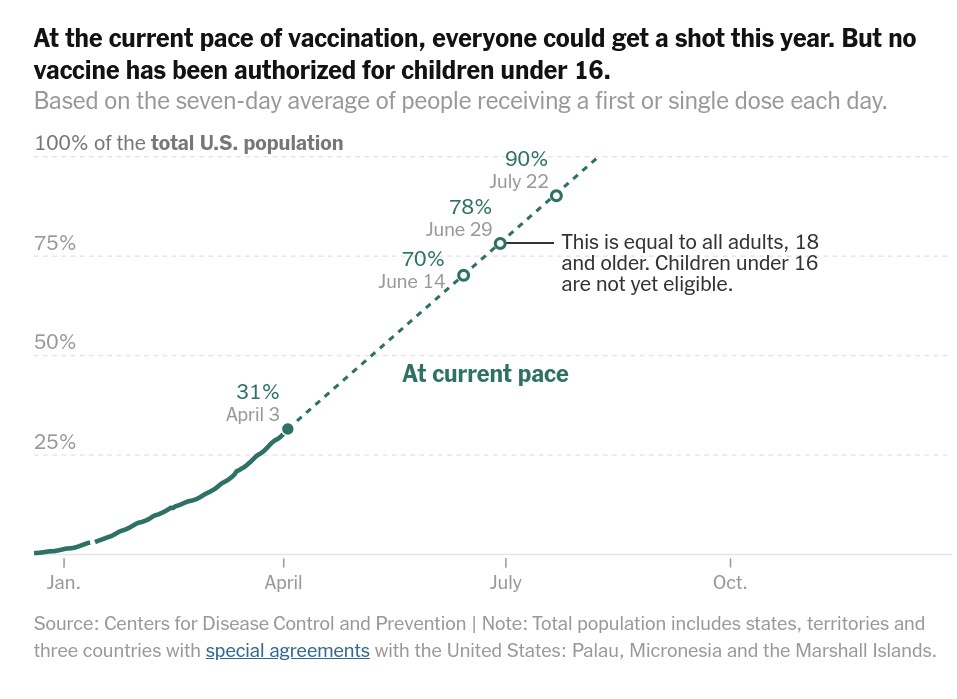Vaccine Stats
The US continues in the right direction.

The vaccination rate in the US continues in the right direction. The seven-day rolling average was 3.07 million a day as of today according to the NYT:

This places the country on a pace to get to at least 200 million doses administered by Biden’s 100th day in office:
President Biden promised to administer 100 million vaccines by his 100th day in office. The United States surpassed that goal, which some said was not ambitious enough, on March 19, almost six weeks ahead of schedule. Mr. Biden has since said he hopes for 200 million doses to be administered by his 100th day, a goal that the nation is already on pace to meet.
There is little doubt that the Biden administration was overly conservative in their early estimates. But, under-promising and over-delivering is far better than the reverse.
Here is the projection if the current pace continues:

Granted, to reach those levels it would take a lot of people to ditch their vaccine hesitancy.






My wife signed up to volunteer at a vax site on Saturday, she has been told that the state expects 9000 jabs and registration hasn’t opened yet. Of course NH is (mostly) part of the reality based community.
Please indulge (or at least forgive) me this tedious and pedantic comment. But this quote represents a particular bugaboo of mine when it comes to public discourse – that is, parroting (too harsh in your case) a talking point (again, too harsh in your case) that sounds good but falls apart under the slightest bit of scrutiny. I so rarely get to exorcise my unreasonable irritation on this matter, hence my doing so here.
Hypothetical 1 under-promise: Under my leadership, the US will administer 100 million vaccines in my first 100 days in office.
Hypothetical 1 over-deliver: Under my leadership, the US did actually administer 200 million vaccines in my first 100 days in office.
Hypothetical 2 over-promise: Under my leadership, the US will administer 500 million vaccines in my first 100 days in office.
Hypothetical 2 under-deliver: Under my leadership, the US did actually administer 300 million vaccines in my first 100 days in office.
Which scenario is (far) better?
@Mimai: why didn’t they have the ability to make 300 million doses in scenario one?
@Mimai: 95% certain that the underpromise/overdeliver vs. overpromise/underdeliver thing is assuming the actual amount delivered is constant in the two scenarios.
@Teve: I’m not sure I understand your question. I was using the hypothetical to counter the notion that under-promising and over-delivering is always far better than the reverse.
But even if we equate the two scenarios on the result (both actually administer 300 million), it’s not self-evident to me that scenario 1 is better (much less far better) than scenario 2.
But again, I’m not sure I understand your question so please let me know if this doesn’t address it.
@Mimai: Mayhaps I am a weirdo, but I prefer the scenario that unfolded: promising 100 and delivering 200.
Yes, 300 is better than 200, but that’s not the issue. The issue I am pointing out is that as a leader, public perception matters. Promising 100 and delivering 200 is a success, both materially and from a perception POV. Promising 500 and delivering 300 is a failure in terms of the promise and the perception. That 300 is better than 200 is true, but misses the point about perception, which matters in politics (and life in general).
@Gustopher: Yup.
@Mimai: Of course, it probably behooves us to specify what it is that is better. I was implicitly focusing on shots in arms. Steven may have been focusing on political matters. If that is the case, then I concede his point and retract my tedious pedantic hypothetical……reserving the right to be tedious and pedantic in the future (until I wear out my welcome).
@Mimai: Argh, I’m always late to the dance. Upon reading Steven’s follow-up and perfectly reasonable (not weird) comment, I shall retreat to the corner and lick my wounds.
@Mimai: No worries. I am especially cognizant of the underpromising/overdelivering dynamic in my day job as a college Dean. 😉
@Steven L. Taylor: Ha, yes! My dean is VERY attentive to this. Too attentive in my opinion, but mine is an easy opinion to hold from the sidelines.
@Mimai: No one else has quite made this point, so I will:
The problem of over-promising has nothing to do with the actual delivery. The problem is that it sets up everyone down the line from that promise to fail.
If you promise 500 million shots, then governors, county executives, and other people following that lead will plan accordingly, anticipating and promising that the schedule for reopening might come a few months earlier. And that promise cascades down to citizens having more hope for a return to normalcy a few months earlier, opening up and committing to capacity according to those expectations.
When you under-deliver, then that entire chain of dominos collapses. Public trust takes yet another hit, businesses that thought they could anticipate revenue might go under unnecessarily, people attend large gatherings in defiance of public mandates. Another 100 million doses might be enough to offset that, but it might not.
Over-promising is a sign of incompetency. It’s what most politicians do, with campaign promises, and thus why we put no stock in those promises unless there are numbers to back them up, and even then, we still doubt their ability to actually wrangle the politics.
@David S.: I think this is a good point. But I don’t think it’s dispositive. It presupposes that the initial over-promise is actually taken seriously by everyone down the line. So seriously in fact, that they base their plans on it.
While it certainly is possible that the over-promise is acted upon, it is far from certain. Indeed, you note that over-promises on campaign matters are summarily dismissed. So it’s not clear to me why over-promises on vaccine administration would be given considerable weight. Especially when so much depends on things that our outside the promiser’s control.
I say all this not to discount your point, but to merely say that the outcome isn’t so certain. Indeed, if I were to squeeze the stone for an argument in support of over-promising, it might go like this:
The under-delivery might put pressure on the various points up the chain. And this pressure might lead to an extra concerted effort to get vaccines in arms, which might lead to, well, more vaccines in arms. Indeed, over-delivering might lead to premature self-congratulatory resting on one’s laurels, resulting in a plateau effect of vaccine administration.
Please don’t get me wrong, I don’t think the aforementioned argument is rock-solid (or even solid at all), but it doesn’t strike me as ridiculous.
@Mimai: Right. Over-promising, in the best case scenario, is not taken seriously because the trust doesn’t exist in the first place. In other words, it is least damaging when it is the most pointless.
Why make a promise at all, in that case? Why not just deliver on 200 or 300 million vaccines without any estimate for how many on what day? What’s the purpose of a promise?
This is, and I say this without malice, exactly what we mean by Trumpian incompetence: a massive promise, an utter lack of actual planning to substantiate that promise, and the vague expectation that mysterious forces will exert pressure invisibly to make everything alright. This is the Wall. This is Infrastructure Week. This is the Kraken. It’s a confidence game.
Without even discussing the merit of his promises, this pattern was always suspect because it’s a mark of incompetence. Biden’s Infrastructure Bill is most likely an over-promise, too, I’ll add for the sake of partisan fairness.
Yes, but such a premature resting is itself an over-promise. It’s simply not an over-promise on the count of the doses, but on the effects of the current distribution.
That’s the fundamental problem you’re having. You’re focused on the one data point: the number of administered doses: without relation to the rest of the system. You’re not accounting for the number of infected cases, the number of deaths, the revenues of SLGs and businesses, the overall morale of the population. But as all of these numbers rise and fall, their movement has cascade effects on all the other numbers.
“Premature resting,” as you call it, needs to be more than “resting” to be a problem. It has to be a decision to stop scaling up the distribution apparatus. It has to be a decision to cease PR efforts advocating the vaccines. It has to be more than “we did good;” it has to be, “we did enough.” (And with the current political climate as it is, enough will never be achieved. There’s going to be a population of anti-vaxxers, pretty much no matter what. ) For over-delivery to result in what you anticipate, someone has to make the call to start turning things down, and to make that call, you have to promise that the apparatus is no longer needed.
This isn’t talking out of my ass: over-promising is a quarterly concern for me as an engineer, because when over-promising occurs, the “pressure for extra concerted effort” is applied to me and my coworkers. That extra effort is paid for in quality. So I’m rather exacting about what promises actually get made, because I’ve seen the results when they get broken. Sure, I’m not manufacturing vaccines at a plant or anything, so I’m not the one responsible for the need to recall 15 million doses, but I’m aware of the purposes of the things that I build and the resultant failures that happen when I screw up.
So, no. I do not believe that the extra pressure you hypothesize would have actually led to more vaccines in arms. It’s an empty gesture, but I’d bet cash that it would have led to fewer. And worse, I’d bet that we’d be “failing to notice” the tainted vaccines, rather than having the leeway to discard them without failing to meet the promise, causing an outbreak of who knows what, creating a spiral where people are scared off from being vaccinated.
Again, not making this up:
https://www.nytimes.com/2021/03/31/us/politics/johnson-johnson-coronavirus-vaccine.html
None of the pressure you hypothesize, on track to get the results we want, even despite mistakes causing setbacks. That’s the entire point of competent planning.
@David S.: This is great. Thanks David.
These are politicians. So I assume one primary purpose of a promise is to “win” the news cycle.
You’ll get no argument from me on that. I tend to leave Trump out of these discussions, because I’m usually trying to find guiding principles. And, well, Trump ain’t exactly a man of principles. Also, his name tends to ruin a discussion (ETTTD).
Correct. I focus on shots in arms because these are the most readily quantified outcome we’ve got. They’re also one of the most (if not the most) important. I am tickled though that you, as an engineer, listed “overall morale” among the outcomes.
I disagree here. One outcome of premature resting is, as you note, a ceasing of all the relevant things. But that is not the only outcome. Premature resting could lead people to merely slow down, not work as hard, say “that’ll do for today, I’m gonna head home,” etc. This could lead to the plateau effect of shots in arms that I mentioned previously.
This is the internet. Talking out of one’s ass is acceptable, nay expected.
I agree with the first part, and would join you in placing that bet. I’m less certain than you about the second part.
All that said, as an engineer, you have skin in the game on such matters. Respect. And I can totally understand why you approach this topic as you do. I am not an engineer. One professional hat I wear is as a behavioral scientist, with a particular focus on clinical decision-making. So I tend to approach these topics from a different perspective – which includes cognitive biases/heuristics, incentive structures, individual behavior.
As a final note, I agree that given the circumstances, and with a focus on outcomes that include more than just shots in arms, under-promising and over-delivering is better.
@Mimai:
I’m not so quick to dismiss this notion of setting big goals. Yes, perception matters and you have to communicate in a nuanced way that probably exceeds the American electorate’s ability to comprehend. But if you can inspire bigger things by setting really big goals, that can be very inspiring as well.
Biden is playing it safe with his goals – only setting goals that he *knows* can be reached, and that’s a valid political assessment, particularly given the divided nature of U.S. politics with some percentage of the population willing to die of COVID-19 if it means that the other side loses a House seat or two.
My hope is that Biden can unite us enough with some big, inspiring goals (think Kennedy and his space race), that we are able to move beyond that level of division.
If Biden can’t do it, then I would submit that nobody can.
@Tony W:
Great point. It will be interesting to see how this plays out with non-vaccine related things. Though I am a bit cynical about inspiration from political (and other public) officials these days.
I think that one thing (not the only or even primary thing) that motivates Biden’s political calculus is to be the anti-Trump. Uber empathic. Low profile. Science, science, science. To be sure, some (perhaps a lot) of this is genuine. But he’s a politician, so I suspect a lot of it is performative. Fortunately, I think the performative mostly helps rather than hinders, so I’m cool with that.
Two thoughts:
1. In the wake of Trump, the prudent move was the publically under-promise because confidence in the government was already low. If you hit the symbolic round number of 100 in 100 days, then cool. And more is better. But if you promised 500 and only provided 200, you look like you don’t know what you are doing and create more public distrust in a context where trust is already a problem.
2. There is no reason you can’t plan for more than 100 while promising only 100. Indeed, since we have the capacity yo deliver far more than 100 in 100 days, that would appear to be what happened.
To be clear: if you know you can provide 200 and you promise 100 just to make yourself look like a miracle worker (a la Scotty in Star Trek III), then you are playing a game,
But if you are having to hedge because of uncertainty, I think it is, as a general rule, better to underpromise and overperform than the other way around.
And while ambitious stretch goals can sometimes motivate people to reach a specific target, I am not sure that it works as well as some people think.
But, as with all things, context matters.
How about delivering exactly what you promise? I agree with a publisher that on X date they’ll have Y manuscript. . . and then that’s what happens. It’s been the secret sauce of my career – on-time, on-spec, as promised. Amazon doesn’t make a habit of promising Tuesday then surprising you on Monday.
Over-promising and under-promising are both forms of manipulation, I’m not a fan of either. But deliberate under-promising and over-delivering is infinitely preferable to over-promising and under-delivering. I’ll hire the former again and again and learn to roll my eyes at the manipulation. But the latter approach will be the end of our promising relationship.
The most under-appreciated of virtues is competence. Tell me what you’re going to do and then do it.
@Michael Reynolds: I think if we are talking about something like a writing deadline or other thing that you, as an individual, have a great deal of control over, yes.
Or, as noted above, if there is a great deal of certainty involved with an outcome, then yes.
But if you cannot control the variables entirely, and especially when we are talking about a symbolic goal (such as 100 million shots in 100 days) then you have to make a choice: under-promise or over-promise your guess.
There is a lot more going on with this vaccine promise than precision. It is symbolic politics and confidence building.
But to move it to a personal example: if I am going to have some amount of excess research or travel funding at the end of the fiscal year to share with faculty, but I cannot know exactly how much, am I smarter to provide a conservative estimate (under-promising, likely) or a generous estimate (over-promising)?
Now, yes, if I promise to my boss that I will have a specific report done on a certain date, then I should just tell him it will be done at X and provide it then.
I am incredibly bemused by this discussion, given that I wrote my PhD dissertation (decades ago) on mathematical models and decision algorithms for when to promise the customer their work will be done, given other promises already made and uncertainty in how long it will take to do the work.
Stretch goals are generally more effective at the individual level than at the group level.
Michael’s comment and Steven’s follow-up highlights the distinction between accountability and responsibility. In this case, Biden is accountable but not responsible. Hence, and again stipulating that we are talking about more than just shots in arms, it is wise to under-promise, with the hopes of over-delivering.
@DrDaveT: Did you ever go back to the library to see if your $20 bill is still tucked somewhere in the pages of your bounded dissertation?
@Mimai:
I’ve never seen the official bound copy of my dissertation, assuming one exists. I put the $20 toward a bottle of Royal Salute when I learned my defense had been successful. I finished in August and started my new job just a couple of weeks later, so I never got a commencement ceremony either.
@Mimai: Just responding at a more human level, but
Engineering is my day job. When I’m not being paid, I try to figure out how to fix the world, which is more complicated and needs to factor in fuzzy, difficult-to-quantify things. Hence why I’m on this blog at all. Also I’ve been shifting into a mentor role lately and caring about feelings is relevant.
@Michael Reynolds:
Ideal, if you can see the future. Then it’s not a promise; it’s either honesty or lying. A lot of project-manager black magic comes down to statistical tricks to make estimation exercises result in higher precision.
The question of promises comes when you can’t nail it down with enough precision. Your publisher probably doesn’t really care if you’re late by a day, for example, but gets antsy when you’re late by a week and hostile when you’re late by a month. So if you firmly believe you can finish it in February, then promise February. But if you’re only kinda sure, then promise March. In the worst case scenario, it collects dust for a month before the editor can get to it.
That’s not manipulation; that’s confidence interval. I do agree that under-promising in an effort to manipulate is bad, but that’s not because it’s under-promising; it’s because it’s manipulating.
Actually, they do for me. I can’t tell you the number of times I’ve specified a single delivery date and instead had my packages received in dribs and drabs across the week before that. And, not Amazon per se, but I just received a package yesterday that was promised to me Monday. Worst case scenario? Mail theft, the which is why systems for securing received packages, like Amazon lockers or UPS customer care centers or USPS PO boxes, have been developed.
If anything, (and this is a guess; I don’t know Amazon’s internal workings) Amazon consistently over-promises and then their workers pay the price by peeing in water bottles and otherwise getting worked to exhaustion. (Also see: videogame industry “crunch”.)